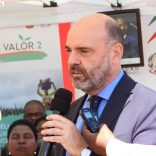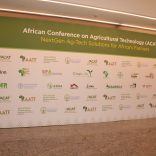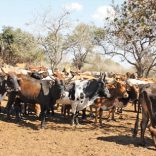Mozambique: Regadio 7 de Abril hampered by electricity debts
Mozambique: Walking the walk to a place among the main coffee producers in Africa

FILE - For illustration purposes only. [File photo: Gorongosa National Park]
Mozambique currently has around 300 hectares in coffee production and, as the country celebrates 50 years of independence, coffee producers want to see the country’s name among the main producers on the continent.
“We are in a very embryonic phase, but the idea is to keep working [to assert ourselves]. We cannot compete with the big players now, we are just starting out. What we have to do is produce quality coffee so that we can win this market outside Mozambique,” president of the Mozambican Coffee Growers Association (Amocafé) Jenaro Lopes says in an interview with Lusa.
Systematic coffee production in Mozambique began almost five years ago, and is concentrated mainly in Gorongosa, in the centre of the country.
READ: Expo Café Mozambique 2025- Celebrating 50 Years of Mozambique’s Independence
This year, Mozambique expects to produce almost 100 tons of coffee, having managed 40 tons last year.
The current strategy has €4 million in funding from the Italian Cooperation Agency (AICS), plus the involvement of more than 2,200 producing families.
“In the context of the 50 years anniversary, I think that, in the coffee market, we are developing. In the last five or seven years, we have been expanding our machambas [agricultural fields] and we are motivating farmers. […] In the future, coffee will have the option to be known as ‘Made in Mozambique’, and be exported,” explained Mussa Abdul, producer of the Café de Ibo brand from Cabo Delgado province, in the north of the country.
Although the dream of seeing the country among the main continental players is common to all national producers, there are challenges, especially for the companies that process the product.
“The challenge for us is purchasing the production equipment, which is very expensive. Given that the country is not used to drinking coffee, the demand is still small […]. However, since 2020, we have been noticing the growth of demand,” said Edna Katondo, coordinator of Gorongosa Coffee, one of the main Mozambican coffee brands, which is already exported to several countries, including Europe.
In addition to the challenges in acquiring the processing equipment, the country’s legal framework is also seen as a challenge to the production chain, and Amocafé is in contact with the authorities regarding improving the laws.
“A document has already been submitted to the government with the terms of reference [to improve the industry]. We are now in contact with the government and some more conversations are planned. The ambition is to improve the coffee production chain in Mozambique,” the president of Amocafé concluded.
READ: Mozambique: Government expects almost 100 tonnes of coffee production this year
The strategy for developing this crop in the country will prioritize research, investment and training of technicians, with the aim of reaching around 5,000 hectares of production area in a 10-year plan.
In Africa, Ethiopia, considered the “birthplace of coffee”, is the largest producer and, between 2023 and 2024 alone, the African country yielded around US$1.4 billion (€1.21 billion) from the production of 298,500 tons, according to official statistics.












Leave a Reply
Be the First to Comment!
You must be logged in to post a comment.
You must be logged in to post a comment.